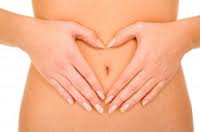- Key Features:
- Chronic abdominal pain or discomfort
- Bloating and gas
- Diarrhoea, constipation, or both
- Relief of symptoms after bowel movements

Common Symptoms of Irritable Bowel Syndrome (IBS)
✅ Abdominal cramping
✅ Irregular bowel habits (diarrhoea, constipation, or alternating)
✅ Excess wind and bloating
✅ Mucus in the stool
✅ Nausea or fatigue
???? Symptoms often worsen with stress, eating, or hormonal changes.
If you suffer from Irritable Bowel Syndrome (IBS), you know how frustrating it can be to pinpoint exactly what’s causing your bloating, cramps, or unpredictable bowel movements. The truth? Your diet and lifestyle play a huge role.
In the UK, certain foods and daily habits are far more likely to trigger IBS symptoms than others. By understanding these triggers, you can take control of your gut health and find real relief.
Let’s break down the biggest dietary and lifestyle culprits—and what you can do about them.
A. Food Triggers (The Biggest Culprits!)
Certain foods are notorious for irritating the digestive system, leading to bloating, gas, diarrhoea, or constipation. Here are the most common offenders in the UK diet:
1. High-FODMAP Foods (Fermentable Carbs)
FODMAPs (Fermentable Oligosaccharides, Disaccharides, Monosaccharides, and Polyols) are short-chain carbs that ferment in the gut, causing gas, bloating, and cramps.
Common high-FODMAP foods in the UK:
✔ Onions & garlic (used in many pre-made sauces, soups, and ready meals)
✔ Wheat & rye (bread, pasta, cereals)
✔ Beans & lentils (baked beans, chickpeas)
✔ Certain fruits (apples, pears, mangoes)
???? UK Tip: Many Tesco, Sainsbury’s, and Waitrose stores now stock low-FODMAP alternatives (check the "Free From" section).
2. Dairy Products (Lactose Intolerance Link)
Many IBS sufferers also struggle with lactose intolerance, where the body can’t properly digest milk sugars.
Common triggers:
✔ Cow’s milk
✔ Soft cheeses (ricotta, cottage cheese)
✔ Ice cream
✔ Cream-based sauces
???? Try This: Swap for lactose-free milk or plant-based options (almond, oat, or coconut milk).
3. Spicy & Fried Foods (Gut Inflammation)
Spicy curries, fried fish & chips, and greasy takeaways can irritate the gut lining, leading to:
✔ Stomach pain
✔ Diarrhoea
✔ Acid reflux
???? UK-Friendly Alternative: Opt for grilled, steamed, or baked dishes with mild seasoning.
4. Caffeine & Alcohol (Bowel Stimulants)
Coffee, tea, energy drinks, and alcohol can overstimulate the gut, causing:
✔ Urgent bowel movements (IBS-D)
✔ Dehydration (worsening constipation in IBS-C)
???? Better Choices:
✔ Herbal teas (peppermint, ginger)
✔ Low-alcohol or non-alcoholic drinks (many UK pubs now offer great options)
5. Artificial Sweeteners (Sorbitol & Xylitol Trouble)
Found in sugar-free gum, diet drinks, and "low-cal" snacks, these sweeteners draw water into the intestines, leading to:
✔ Bloating
✔ Diarrhoea
???? Check Labels: Avoid products with sorbitol, mannitol, xylitol, or maltitol.
B. Stress & Mental Health (The Gut-Brain Connection)
Did you know? Your brain and gut are in constant communication. Stress, anxiety, and even lack of sleep can worsen IBS symptoms.
How Stress Triggers IBS in the UK
✔ Work pressure & long hours → Increased cortisol → Gut sensitivity
✔ Financial stress → Anxiety → Digestive slowdown or urgency
✔ Poor sleep → Disrupted gut microbiome → More bloating & discomfort
???? UK-Specific Stress Relief Tips:
Try NHS-recommended CBT (Cognitive Behavioural Therapy) for IBS
Gut-directed hypnotherapy (available via some NHS trusts)
Mindfulness & yoga (free apps like Headspace or NHS Mind Plan)
121 Dietitian Gut Program – A Personalised Plan That Works
If you're dealing with gut issues like IBS, the 121 Dietitian Gut Program is made to give you clear, personal support that really helps.
To get started, you’ll fill out a 7-day food diary and a simple questionnaire. This helps us understand your diet and overall health before your first appointment.
In your 60-minute session, we’ll talk about what you eat — from proteins and carbs to vitamins and minerals. If needed, we’ll also look into the Low FODMAP diet to manage your symptoms.
You’ll get a 4 to 8-week elimination plan, complete with:
24/7 email support
Easy-to-follow meal ideas and recipes
Shopping lists made just for your needs
Advice to help your gut heal
In some cases, we might suggest blood tests to check for nutrient gaps. After a few weeks, we’ll have a follow-up session to see your progress. If your symptoms are better, we’ll guide you on how to safely bring back foods you removed.
Everything you need — including letters for your doctor or consultant — is part of the program.
Also, since 2021, we’ve added two new programs that build on this original one. They’re designed to offer even more help depending on your needs.
Want to know more? Visit the 121 Dietitian website to explore the full program and see how it can help you feel better, naturally.
- f you are not sure of the service you require we suggest you arrange an express consultation to discuss your concerns with a Dietitian so you can be guided.
- Our NI Clinics are Located in Holywood and our online Clinics are via our Practice Better portal (no additional equipment needed).
- Please call +447717392306 or email: [email protected]